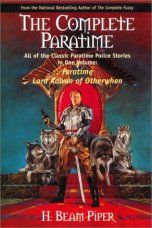
Paratime
H. Beam Piper
246 pages
published in 1981
I had reread Lord Kalvan of Otherwhen some three months ago, but had never read or even seen any of the Paratime short stories Piper wrote before he started on Lord Kalvan of Otherwhen. Luckily then that I found a copy of The Complete Paratime, which collects both Lord Kalvan of Otherwhen and the Paratime collection Ace books published in 1981. This collection contains all of the Paratime short stories Piper wrote during his life, apart from the two novellas (Gunpowder God and Down Styphon) which would later be reworked into the Lord Kalvan novel.
These stories are quite different from Lord Kalvan. In that novel, the whole idea of Paratime and the Paratime police is just the deux ex machina which starts the story proper, while in the short stories the focus is on the Paratime police itself. They have therefore much more of a science fiction feel to them. They are however clearly set in the same universe; the style of writing is quite similar.
One thing should be made clear: with the exception of the first story, these are not alternate history stories. In an alternate history story the emphasis is on the way history is different from reality, but there need not be (and usually isn't) any awareness of alternate/parallel time tracks. AH stories tend to be conservative and focus on obvious changes: Hitler winning WWII or the South winning the American Civil War for example. There is little of that here: the timelines visited in these stories are much more different from ours, with changes generally lying outside our own recorded history; you can't get there from here easily.
The central idea of the Paratime series is that there are thousands upon thousands of alternate timelines, all diverging from a Martian attempt to colonise Earth some 100,000 or so years ago. In most timelines this attempt failed, in some it succeeded. In the home timeline of the Paratime Police the attempt worked the best and the colonists eventually developed the highest known culture of all the timelines, the only one to develop paratime travel. Some other timelines are just as advanced but have no paratime travel, most others are much less advanced. With its secret of paratime travel, the Home Timeline has establed a commercial empire involving hundreds or thousands of timelines. Those empty of human live (the Martian colonisation failed) are exploited openly, sometimes with labour imported from less advanced timelines. Other timelines, especially the more advanced ones are exploited in secret: the first duty of the Paratime police is to safeguard the secret of paratime.
What is interesting about the Paratime Police is that they aren't another group of Lensmen or Green Lanterns; they're the enforcement arm of an at the very least amoral empire, not so much interested in justice as in the security of their empire. We are certainly meant to identify with Verkan Vall, the hero of the series, but Piper is honest enough not to hide the essential exploitative nature of the Paratime empire from his readers.
-
He Walked Around the Horses (1948)
Not really a Paratime story, this is based on the famous incident of the British diplomat who walked around the horses of his carriage and was never seen again. Piper reveals what happened to him after he disappeared. As such this is the only story in the collection that is a proper alternate history tale. As is de rigeur for this sort of story, there's an ironic twist at the end of it... -
Police Operation (1948)
This is the first proper Paratime story, introducing Verkan Vall and the Paratime police itself. Vall is on the hunt for a lost Venusian Nighthound, in a mountainous region of the US on a world much like our own, while a group of state troopers is on its trail as well. Some echoes of Lord Kalvan are already present here. However, there are also some details of how paratime travel works that are left out of the later stories, most importantly the idea that there are thousands of timelines which only differ in slight detail from the Home Timeline. -
Last Enemy (1950)
In this story Verkan Vall and his wife Hadron Dalla are stationed on an advanced timeline in which reincarnation is not a fringe belief, but established scientific fact around which the entire society is organised. Vall and Dalla are caught in a political struggle between rival factions each with their own theories about reincarnation and no hesitation in using deadly force to settle those differences. of -
Time Crime (1955)
Here Vall is on the trail of a group of renegade paratime travellers, who engage in slave trade between backward timelines. This is the longest story in the book. It's also the story that's the most morally ambigious. While Vall tracks down and defeats this group of slavers, it's clear this isn't an incidental crime, that this happens more and that the Paratime Empire as a whole profits from exploiting backward labourers in ways that are little better. -
Temple Trouble (1951)
On a backward timeline, a group of Paratime criminals are exploiting native superstition and religion to get their hands on deposits of rare and valuable metals. Vall shuts them down.
I've always had a weakness for good alternate worlds/timetravel/time police stories ever since reading at an impressionable age both Isaac Asimov's The End of Eternity and some of Keith Laumer's alternate world stories. H. Beam Piper's take on this genre is one I enjoyed very much. Recommended to anyone who likes this genre. It's interesting what Piper would've done with this series had he not committed suicide in 1964.
Read more about:
H. Beam Piper,
Paratime,
science fiction,
book review